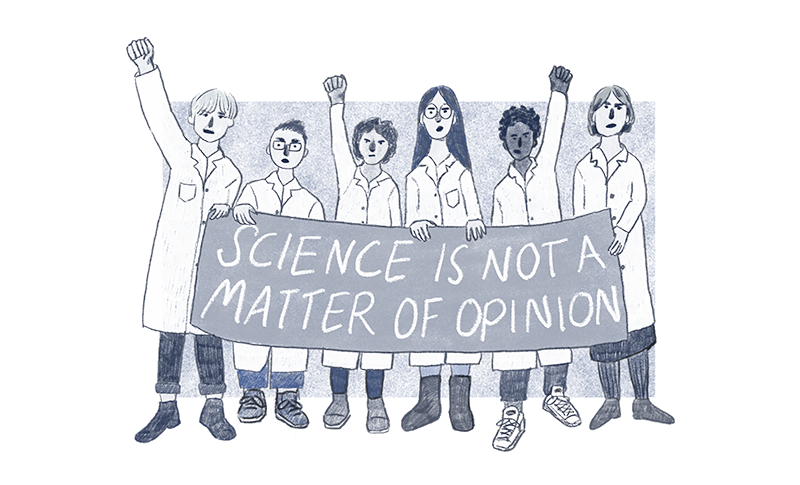Heaven help scientists who chain themselves to something, start a campaigning group, launch a petition or otherwise swing into action. They can expect their credibility to be questioned – by their opponents, but sometimes even by their colleagues. Do the critics have a point? Are they right that it’s difficult to combine scientific objectivity with activism? Resource sounded out opinions on campus.
‘You can’t just keep your mouth shut’
Susanne van Donk, researcher at Wageningen Marine Research and co-founder of Scientists4Future Wageningen
‘It is easier to steer clear of controversy than to become an activist. Yet I didn’t have to think long about my role at Scienists4Future Wageningen. We are in a crisis, and on your own you can easily feel powerless. It is nice to be able not only to talk about it with like-minded people, but also to take action together. I am not dismissive of criticism that says it damages my credibility as a scientist. Although I don’t think that accusation is justified, it still has an impact on me.’
‘But we scientists have certain privileges. We have access to a lot of knowledge, and we have been taught how to interpret all that research. So surely it’s not acceptable to keep your mouth shut when you see things happening that are at odds with the science? No more than you would want medical professionals to say nothing if they have strong evidence that a certain substance is carcinogenic? There has been a scientific consensus about the climate and biodiversity crisis for a long time. In a way, for me, it actually feels like my duty to go into action.’
‘I wouldn’t take to the barricades as a scientist’
Arthur Mol, Rector magnificus
‘Scientists have their opinions and concerns. That always affects their pursuit of science and sometimes sets their research agenda. And it’s not a problem if you’re an activist in a personal capacity. But I draw the line when scientists start using their academic status – with titles and with the name of the organization they work for – in an activist cause they are not experts on.’
‘I admit it’s a difficult line to draw. The same applies when a scientist expresses a strong opinion in the media. For example, don’t express your views on religion if you are featured in the newspaper as a climate scientist. If I see something like that happening, I have a chat with the people in question. The issue at stake is reputation: their own, our organization’s and that of science itself. We have to protect the good “image” of science: it is not all a matter of opinion. But at the same time: I too am worried about climate change, and I get involved in discussion about it. But as a scientist, I would not take to the barricades.’
‘If I don’t speak out, my work won’t contribute much to decisions that are taken’
Marielos Peña Claros, personal professor of Forest Ecology and Tropical Forest Management
‘This sounds like a simple question, but what is an activist? Images spring to mind of people blocking roads or occupying buildings. But that’s not always what it involved. An activist could also be someone who lobbies for change. In both cases, I think: yes, it’s OK for a scientist to be an activist. Especially if you are a researcher in the field of environment, biodiversity and forests.’
‘I am worried and I see that my work – if I don’t speak out – doesn’t contribute much to decisions that are made. That’s why I joined in the campaign against our pension fund ABP, when it was made known that the fund invests our money in activities that contribute to the deforestation of the Amazon. Within five minutes, I and my colleagues in the Forest and Nature Conservation Policy Group knew we had to go into action. We held discussions with people from the pension fund. ABP has now committed itself to zero deforestation and I hope they announce this officially soon.’
‘Even your choice of research topic is political’
Michiel Köhne, assistant professor of Anthropology of Law
‘A lot of knowledge can be used to political ends. Even your choice of research topic is political. For instance, do you study what Unilever says about sustainability, or do you go to palm oil plantations to see what is being promoted there as “sustainable”? Any scientist investigating social issues is involved in politics. You can close your eyes to that, but you are just fooling yourself.’
‘If you have written a text with the potential to be influential, you can file it away and wait to see who looks at it. Then there’s a good chance that nothing is done with it, or that someone else will run with it. In that case, you have no more influence over it. So it is almost your responsibility to ensure that the knowledge you produce is used for purposes that you see as important.’
‘Many scientists are afraid of being taken less seriously if they engage in activism. What’s interesting is that Dutch universities are not very activist these days; they used to be much more so. And it never really damaged public confidence in the sciences.’ CJ
‘I’ve been voicing more criticism lately’
Pieter Zuidema, professor of Tropical Forest Ecology
‘I won’t say it’s not OK, but it’s not how I operate. In my role as a scientist, I want to be able to be independent. A link with a campaigning organization can hamper that independence. My role as a scientist is to explain and interpret things and give warnings, for example when the media ask me for my views on deforestation or the illegal timber trade. But I don’t go looking for it, that’s not in my nature.’
‘Although I have changed a bit in that respect. I’ve found myself voicing more criticism lately. For a lot of ecologists like me, it is increasingly frustrating that you know what is wrong and how it can be righted, but it is still not being done. I formulate things more sharply than I used to. And in my lectures, I am clearer about the urgency of the problems. But gluing myself to a tree? No, not this year, not yet.’

 Illustration Ilja Bouwknegt
Illustration Ilja Bouwknegt 

